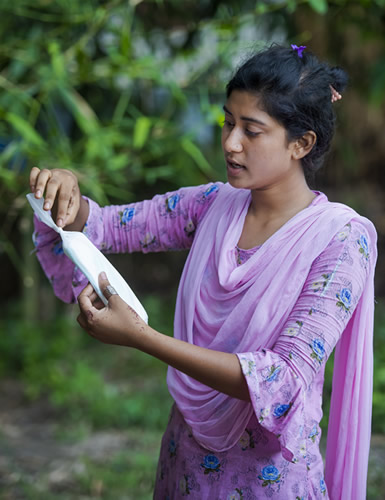Amrai Pari Paribarik Nirjaton Protirodh Jot (WE CAN)
STORY

FARHANA SHIMU:
One small initiative can bring big change
Farhana Shimu grew up in a village at Gongachor purbo moddho para. She had a typicalchildhood like every girl there where she had to go through all the social bindings and rules.
Currently, she is studying as a 3rd year student in Shorkari Begum Rokeya College at Rangpur.A lot of her female friends, class mates, and play mates were not able to attend colleges anduniversities as they all got married while studying in school. They became mother at an early ageand were seen to be unhappy with their relationships. Some of them face domestic violence at in-law’s house as well as in their husband’s house. However, they are not able to find any escapefrom this as they don’t have higher degrees for enrolling in a proper job due to getting married atan early age. Unfortunately, if they leave their husband’s home, they will be considered as aburden in their own families.
She came to realize that these are long standing issues and everyone including her relatives,classmates, and neighbors have gone through these. She was inspired after participating in thistraining and ultimately became a change maker. She went to the family of the girls agingbetween 11 to 19 and tried to counsel them regarding the negative outcomes of childhoodmarriage. Unfortunately, they did not heed to her words and in turn scolded her when she tried todiscuss regarding childhood marriage.
Shimu then decided to go to every parents with proper documentation as they seem to takeofficially written statements seriously. She created a deed of agreement and collected signaturesfrom every parents in her village where they all agreed against childhood marriage. Thus,whenever there were events involving childhood marriage, she would go and present theagreement to stop it. This was an effective initiative mostly with one exception where achildhood marriage event happened covertly, which she was unable to stop.
The idea regarding childhood marriage and female menstrual cycle became vivid and importantto her after attending the training program in Amrai Pari. She encouraged all the females in hervillage to stop believing in all the superstitions regarding female menstruation and starteddiscussing ways to maintain proper hygiene during menses. She explained the benefits of using asanitary napkin as well as the ways to preserve/maintain the clothing used instead of sanitarynapkin. Initially, some people did not take her work seriously and cracked jokes. However, shecontinued to work on her motive. Her persistence finally made the people in her village awareabout maintaining proper hygiene during menses.
Shimu also actively works against female’s domestic violence. If anyone she knows is a part ofdomestic violence, she tries to explain their spouse regarding the penalties for such crime so thatthey abstain from such activities in the future. Fortunately, her counselling has worked for somefamily where the husband stopped further domestic violence.
About Us
Amrai Pari Paribarik Nirjaton Protirodh Jot (WE CAN) is a collective platform of civil society, organizations, individuals, institutions and others aim of ending violence against women.
Keep In Touch
Amrai Pari (WE CAN) Secretariat
6/4 A, Sir Sayed Road (2nd Floor)
Mohammadpur, Dhaka-1207 Bangladesh
Tel: +88 02 41023217
E-mail: [email protected]
Web: www.wecan-bd.org
Copyright © 2018 All Rights Reserved By We Can Bangladesh
About Us
Amrai Pari Paribarik Nirjaton protirodh Jot (WE CAN) is a collective platform of civil society, organizations, individuals, institutions and others aim of ending violence against women.
Keep In Touch
Amrai Pari (WE CAN) Secretariat
6/4 A, Sir Sayed Road (2nd Floor)
Mohammadpur, Dhaka-1207 Bangladesh
Tel: +88 02 41023217
E-mail: [email protected]
Web: www.wecan-bd.org
Copyright © 2018 All Rights Reserved By We Can Bangladesh
